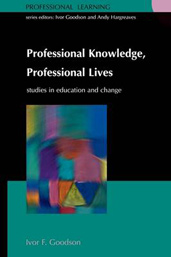Professional Knowledge, Professional Lives: studies in education and change
Educational Research as a Public Intellectual
Halsey notes that what he calls the high professors 'The leading one tenth of academic staff' are disproportionately the highest qualified in terms of first class degrees and disproportionately more productive (Halsey, 1992, p. 252). They are also disproportionately linked to the establishment - a fifth of all high professors are privately schooled as opposed to 15% of the general population. Halsey wrote:
Oxford and Cambridge, with their close ties both in recruitment from the well-to-do and as suppliers to the elevated metropolitan institutions of State and Industry, are also dominantly the nurseries of both the intellectuals and the powers. Such a pattern of connection has undoubtedly given Britain an integrated establishment of political, economic, and cultural management (Halsey, 1992, p. 252).
Moreover, he notes that the high professors are to the right of their colleagues, 'both in their subjective place on the political spectrum and their voting record' (Halsey, 1992, p. 256).
However, Halsey also notes that, as always in British life, there exists across the academies what Orwell called 'the awkward squad' - a group that refuse hegemony for one reason or another, ranging from leftish commitment through to personal refusal.
Of course it would be wrong to equate intellectuals with academics. But, since the word, intellectual, first emerged in Russia to characterise the nihilistic university students, more and more intellectual life has been colonised by the massive expansion of universities. Edward Shils describes intellectuals as “... persons with unusual sensitivity to the sacred, an uncommon reflectiveness about the nature of their universe and the rules which govern society” (Shils, 1972).
In the past, they have found patrons as disparate as royalty, the aristocracy, the church, the army, newspapers, the media, welfare and begging. But as Halsey notes, nowadays we are forced to the conclusion that 'institutions of higher education are their major institutional location' (Halsey, 1992, p. 252).
